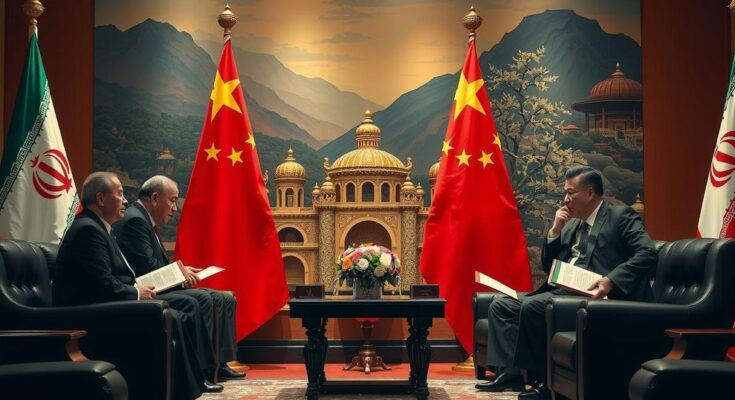The International Christian Concern warns that China’s renewed commitment to support Iran could escalate the persecution of Christians in both nations. This relationship was emphasized by Chinese President Xi Jinping’s remarks at the BRICS summit, where he affirmed enduring cooperation with Iran. Both nations have been marked as violators of religious freedoms, heightening concerns within the Christian community. Recent actions by China, including stringent regulations on religious practices, further illustrate the deteriorating landscape for Christians in these repressive regimes.
The International Christian Concern (ICC), a U.S.-based advocacy group, has raised alarms regarding the implications of China’s increasing alliance with Iran on the Christian community in both nations. Following Chinese President Xi Jinping’s reaffirmation of strong relations with Iran during the recent BRICS summit, concerns have been amplified regarding the potential for escalated persecution of Christians. At the summit, which convened significant leaders including Brazil, Russia, India, China, and South Africa, President Xi expressed, “No matter how the international and regional situation changes, China will unswervingly develop friendly cooperation with Iran,” according to reports from Xinhua, a Chinese state-controlled news outlet. The ICC has underscored the grave reality that both China and Iran have been designated as Countries of Particular Concern by the U.S. Department of State, indicating that these nations engage in or tolerate severe violations against religious freedom. “China and Iran are known persecutors of Christians, and their mutual support could lead to increased persecution as both countries work to eliminate the practice of Christianity within their borders,” the ICC stated. In the context of this development, China has recently enacted stringent regulations requiring religious practices, such as sermons, to align with socialist values and reflect Chinese characteristics. Clergy are now compelled to pledge allegiance to the Chinese Communist Party. These actions follow years of systemic abuse where numerous Christians have faced torture, harassment, and imprisonment by government authorities. A report released by the U.S. Commission on International Religious Freedom revealed alarming practices whereby Chinese officials have replaced Christian symbols in churches with images of communist leaders and party slogans, highlighting widespread instances of religious suppression. Iran, too, is marked by a lengthy track record of oppression against Christians, including executions, imprisonment, and torture. Notably, Iran’s support for terrorist organizations such as Hamas has drawn significant scrutiny, especially after the October 7, 2023, attacks on Israel, which resulted in extensive loss of life and suffering. As the Muslim population in Iran predominantly consists of Shi’a Muslims, avenues for Christian practice face severe restrictions. The ICC’s remarks encapsulate the dire circumstances for Christians under the regimes of both nations, noting the distress provoked by the alliance between China and Iran. “China’s unwavering support of Iran, regardless of Iran’s persecution of Christians and backing of terrorists, shows the world where its priorities lie,” the ICC expressed. Furthermore, the ICC posits that the BRICS coalition appears to be oriented towards altering the global power dynamics currently dominated by Western nations, aiming to challenge the supremacy of the U.S. dollar as the primary global reserve currency.
The alliance between China and Iran represents a strategic geopolitical partnership that raises significant concerns regarding human rights, particularly the treatment of religious minorities, such as Christians. Both countries have been highlighted as engaging in egregious violations of religious freedom, drawing consistent condemnation from international watchdog organizations and governmental bodies. As China fortifies its ties with Iran, particularly amid global economic and political shifts, the potential ramifications for persecuted Christians are dire. The BRICS summit’s outcomes, which indicated a commitment to deepening bilateral cooperation, further compound these worries, as both nations exhibit a tendency towards oppressive governance and religious intolerance.
This report elucidates the troubling implications of the burgeoning alliance between China and Iran, particularly regarding the intensification of persecution faced by Christians in both regions. As both governments continue to espouse policies that curtail religious freedom, the consequences for religious minorities become increasingly severe. The alarming endorsement of Iran by China amidst its own history of religious suppression raises urgent questions about the international community’s response to such transnational partnerships that undermine human rights frameworks.
Original Source: www.christianpost.com




